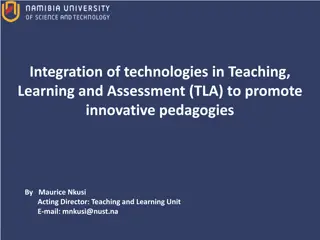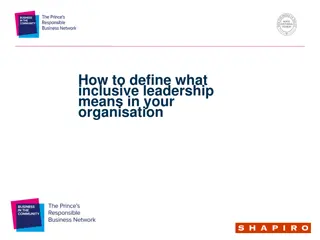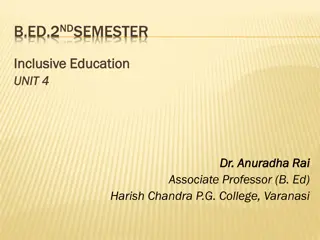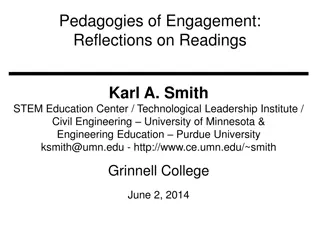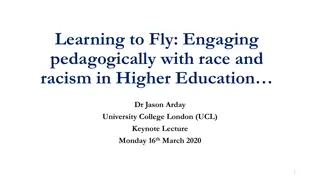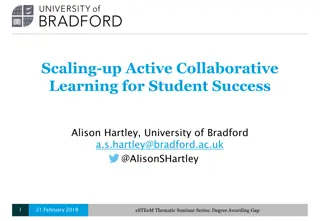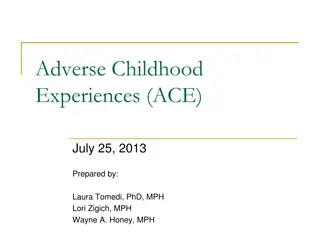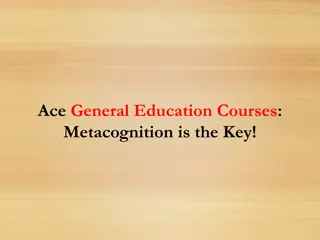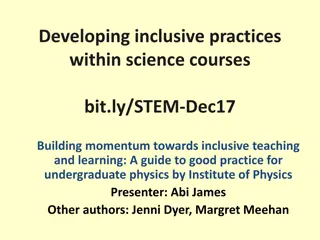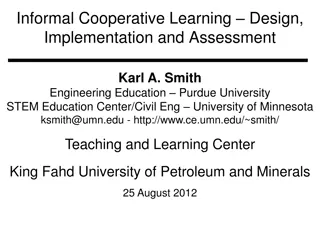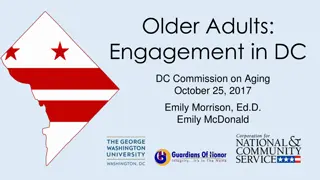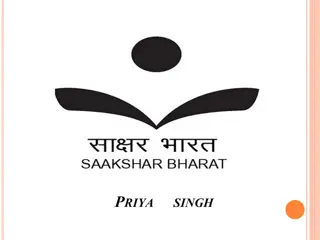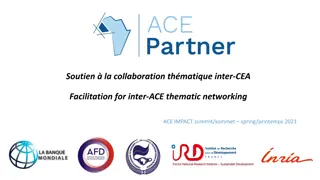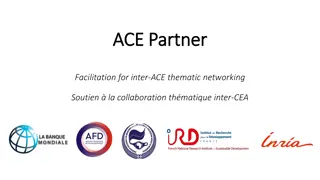Inclusive ACE Pedagogies: Enhancing Learning Opportunities for Adults
Drawing from programs of research and community-based learning, Adult Community Education (ACE) pedagogies provide pathways for hard-to-reach learners, emphasizing learner-centered approaches and individualized learning experiences in comfortable and engaging spaces. Men's Sheds and Neighbourhood Houses offer inclusive environments for skill-sharing, knowledge exchange, and personal development, supporting participants in further education and training.
Download Presentation

Please find below an Image/Link to download the presentation.
The content on the website is provided AS IS for your information and personal use only. It may not be sold, licensed, or shared on other websites without obtaining consent from the author.If you encounter any issues during the download, it is possible that the publisher has removed the file from their server.
You are allowed to download the files provided on this website for personal or commercial use, subject to the condition that they are used lawfully. All files are the property of their respective owners.
The content on the website is provided AS IS for your information and personal use only. It may not be sold, licensed, or shared on other websites without obtaining consent from the author.
E N D
Presentation Transcript
Inclusive ACE Pedagogies CAPABILITIES FOR WORK, SKILLS AND LIFE ANNETTE FOLEY- FEDUNI TRACE OLLIS DEAKIN UNI
Drawing from findings from programs of research including: A Men s Sheds and community based learning discussion drawn from: ACE Pedagogies and practices ACE and out of school programs Neighbourhood Houses Recent DET project
ACE provides first step learning for hard to reach learners ACE is based in community for local community What do ACE is broad and includes lifelong learning, accredited and pre accredited and community based learning. we know? ACE provides pathways to further education and training and work ACE pedagogies are learner centred
Engaging and comfortable spaces Learner autonomy Early School Leavers and ACE Negotiated learning Individualised approaches Applied learning Feels relevant feel heard and respected don t feel like teachers
There are approx. 1,300 registered Mens Sheds in Australia. They provide a place for mainly men to come together and share skills and knowledge and friendship. First Shed called just the shed was set up in Goolwa South Australia in 1993. The first two community Men s Sheds were opened in 1998. Despite being less known the first Women s Shed was set up in 2010. There are 2,850 shed based organisations in Australia (Golding, 2021) Men s Sheds The most common reasons for attendance is friendship, enjoyable, sharing skills and gendered.
There are approx 400 neighbourhood houses in Victoria. More than 1000 across Australia. They provide pre-accredited and accredited training, only 8% of providers provide accredited training. Feminist history, women s movement, safe places for women, learning, childcare to support women s re-entry in to the workforce. Neighbourhood Houses Women (74%) are the majority of participants (Perry & Richards, 2019). The most common reasons were a course or a class at 34% followed by social group at 30%
Pedagogy and practice in ACE Small size classes provide an intimate and personalized approach to the learning needs of adults. Didactic or front-end-loading approaches to teaching rarely occurs in these spaces of learning. Adult learning, experiential and applied learning pedagogies are used to engage learners with the content of the material. Draws on the experiences of adult learners as sources of class content, co-construction of curriculum between teachers and learners is a feature. Learning is social and relational
Moving beyond a narrow construction of employability skills The The Capabilities Approach a theory developed by Amartya Sen (1981) looking at Human Rights from a political and economic position. This position was extended by Martha Nussbaum (1997) looking more broadly at human rights. Making use of 10 Human Capabilities Capabilities Approach to learning,
How can ACE rethink learner centred approaches through the lens of The Capabilities Approach?
ACE Learner Capabilities A Model (Foley & Ollis, 2022) Developing and maintaining relationships for life Diversity is respected and valued Feel respected and valued Space and place: A safe learning space The ability to identify their own strengths and areas for development Capability to build practical reason, critical reflection, and imaginative thought Literacies for life, work, and study Teamwork and collaboration Learning: Communication and problem solving Personal capabilities: The ability to live a healthy life Healthy and sustaining relationships Building interpersonal skills Self and other awareness




